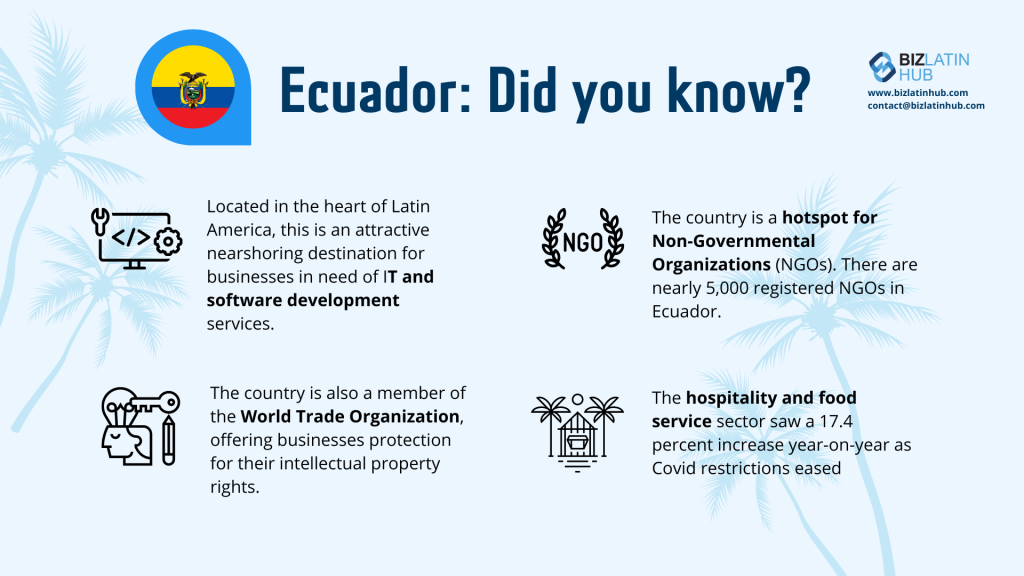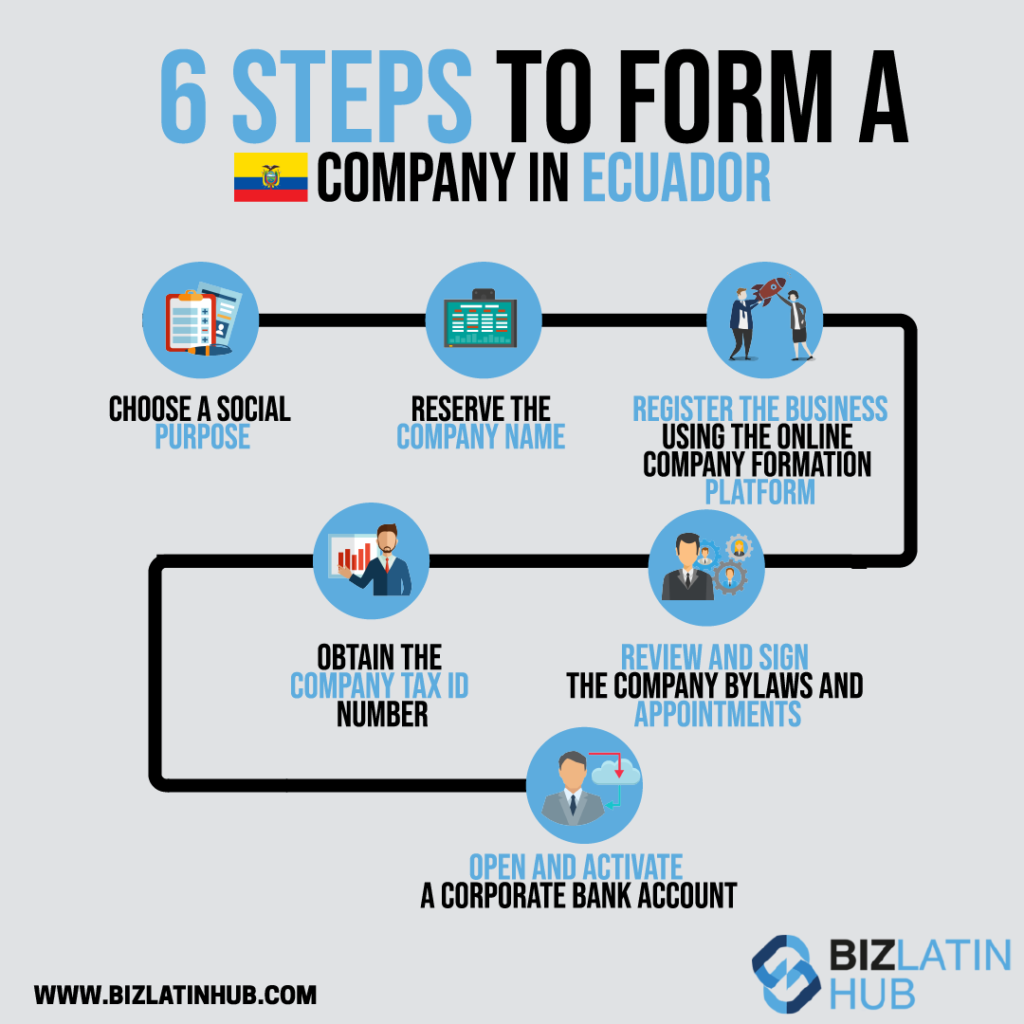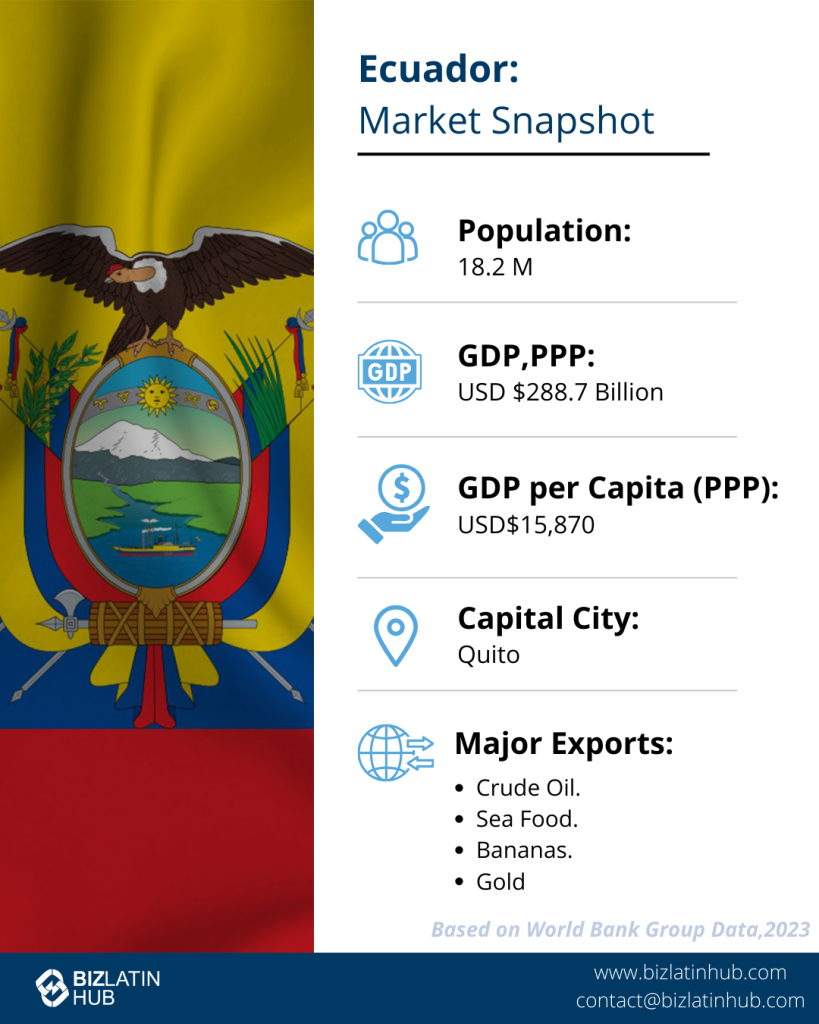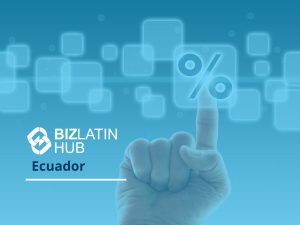Gain key insight into business etiquette in Ecuador to integrate smoothly into the country’s commercial culture and make crucial inroads with clients and partners. This is absolutely essential if you are considering company formation in Ecuador, as you will need to navigate corporate culture carefully. For example, Ecuadorians may be a lot more formal than you are used to and place importance on social connections.
Key takeaways on business etiquette in Ecuador
| Are personal relationships important when doing business in Ecuador? | A great deal of importance is placed on building personal relationships, for example through business lunches and dressing well |
| How important is punctuality for business etiquette in Ecuador? | Ignore the stereotypes and make sure you do things on time to make a good impression and double check arrangements. |
| Is remote working popular in Ecuador? | Few employers currently offer this, either fully remote or hybrid, but it is becoming more popular. Employees rate it highly as a condition and are happy to work remotely for overseas companies. |
| Do you need to speak Spanish to do business in Ecuador? | Clear communication in English and Spanish will help both with business matters and with building those personal relationships. |
Understand business etiquette in Ecuador
Business etiquette in Ecuador is quite similar to that of its neighbors, Colombia and Peru. There are pertinent regional and specific expectations when connecting in a business capacity.
1. Formal dress
Over the years the worldwide dress code of companies is shifting slightly towards ‘smart casual’ personal presentation. However, Ecuador still takes a relatively conservative approach, mainly in the financial related urban areas such as Quito, Guayaquil, and Cuenca. Blazers, suits, and formal professional wear are recommended.
In coastal climates like Guayaquil, it is more common to see business people wearing lighter formal wear such as a shirt and dress pants instead of wearing a suit.
Generally speaking, Ecuadorian professionals place value on personal presentation, as looking suitable and formal builds a perception of professionalism. Ignoring how you present yourself personally may give off the impression of disorganization, and affect your chances of successfully negotiating or building a strong working relationship.
2. Business lunch
Business lunches in Ecuador are generally longer than many Western business people may be used to. Lunch is the most important meal of the day for many Ecuadorians. Business lunches with clients and partners are therefore a significant event, include a lot of food and conversation, and are usually held in the early afternoon.
Usually, these lunches are used for business conversations and are another potential indicator to your business partners and clients of your professionalism and presentation. Therefore, they often take place in formal, upmarket restaurants, such as those of quality hotels. The organizers of the lunch meetings are expected to pay for those they invite.
Organize your lunch meetings in these kinds of establishments and for longer than the traditional 60 minutes shows that this business meeting is of importance to you. In Guayaquil, the lunch meetings tend to be slightly more formal than in Quito.
On the other hand, dinner is generally organized as a more informal, social event and can happen exceptionally late. Try not to raise the subject of business at dinner, unless your guest or host does so first. Business lunches and dinners are a good way to socialize with your business partners to improve your relationship with them.

3. Building relationships
In Ecuador, getting to know someone beyond the confines of the office is important. Doing business is all about building relationships and trust. Like many other countries in Latin America, business meetings start with small talk. Try to avoid contentious topics like politics.
Formally introducing yourself to someone is highly valued during meetings and could be a significant deciding factor for closing a deal. While in the Western world, business cards may not be as popular a way of sharing contact information as other methods such as connecting over LinkedIn. In Ecuador, however, the use of business cards is still common and therefore make sure that you always carry one with you.
4. Etiquette with meetings
In Ecuador, meetings tend to begin later than agreed. Therefore, if you set up a meeting be very specific about the time. Also, be prepared that meetings can last longer than originally agreed, make sure that you’re flexible.
Moreover, if you set up a meeting 3 weeks beforehand, make sure to confirm the meeting again a few days before the meeting. Be sure to follow up and stay in close communications with people to build a solid working relationship.
5. Language proficiency
The English proficiency index of Ecuador scores a 46.57 out of 100 for English-speaking proficiency in the country. In the larger cities like Quito, Cuenca, and Guayaquil this score is slightly higher. This is also true of university graduates, who are expected to attain level B2 before graduation.
Learning the Spanish language is therefore highly recommended. Having some proficiency in Spanish, or working with a third party who can translate, makes doing business much easier. Having Spanish proficiency also sends a positive message to local partners that you are driven to integrate into the commercial and social environment in Ecuador.

FAQs on business etiquette in Ecuador
These are some of the most common questions we receive from international investors interested in business etiquette in Ecuador.
1. Can a foreigner own a business in Ecuador?
Yes, by either legal persons (legal entities) or natural persons (individuals).
2. Why do business in Ecuador?
In 2024, Ecuador’s Gross Domestic Product (GDP) is valued at approximately USD$115.05 billion. This represents an increase from the $109.167 billion reported in 2022. In terms of Foreign Direct Investment (FDI), the latest available data is from September 2023, which shows that Ecuador received an increase of USD$155 million in FDI.
3. How long does it take to register a company in Ecuador?
The incorporation process usually takes around one to two weeks, depending on various factors such as the complexity of the company structure and the efficiency of the registration authorities.
4. What does an S.R.L company name mean in Ecuador?
SRL in Ecuador stands for Sociedad de Responsabilidad Limitada, which tis ismilar to a Limited Liability Company in English. This legal entity operates independently from its shareholders, offering them limited liability. SRL companies are prevalent due to their simplified requirements, making them a popular choice for business structures.
5. What does an S.A.S company name mean in Ecuador?
S.A.S means Sociedad por acciones Simplificada, which is similar to a Joint Stock Company. This is a type of commercial company with legal personhood and assets independent from those of its owners. Shareholders are liable only up to the amount of their respective contributions.
6. What entity types offer Limited Liability in Ecuador?
In Ecuador the S.R.L (Sociedad de Responsabilidad Limitada) is a limited liability entity type.
What influences business etiquette in Ecuador?

Ecuador has a rich culture, history, and vast biodiversity. Ecuador is made of 4 geographical regions: the jungle, highlands, coast, and islands.
Oil is the most important industry in Ecuador, experiencing a significant economic boost during 2007-2014 due to its production in this sector. The economy is growing to some level but it is a country that has experienced social, political, and economic challenges that impact the country’s business environment.
The majority of the population in Ecuador lives in the central regions of the country such as the Andes mountains or on the coast of the Pacific Ocean. In terms of demographics in Ecuador, it has over 18 million inhabitants, with the majority living in the center regions such as the coast or the Andes mountains.
There are also about 100,000 American and 30,000 European expatriates living in Ecuador, many of whom moved to the country for business opportunities. The Labor Force Participation Rate in Ecuador is around 64.60% according to Trading Economics.
Business etiquette in Ecuador has quite some difficulties which could make it hard to conduct business as a foreigner. When entering a new market, foreign companies may need bilingual commercial representation support to get set up and integrate into the commercial and social environment.
Contact us now, or visit our website at bizlatinhub.com for more information about doing business in Ecuador.
Learn more about our team and expert authors.






